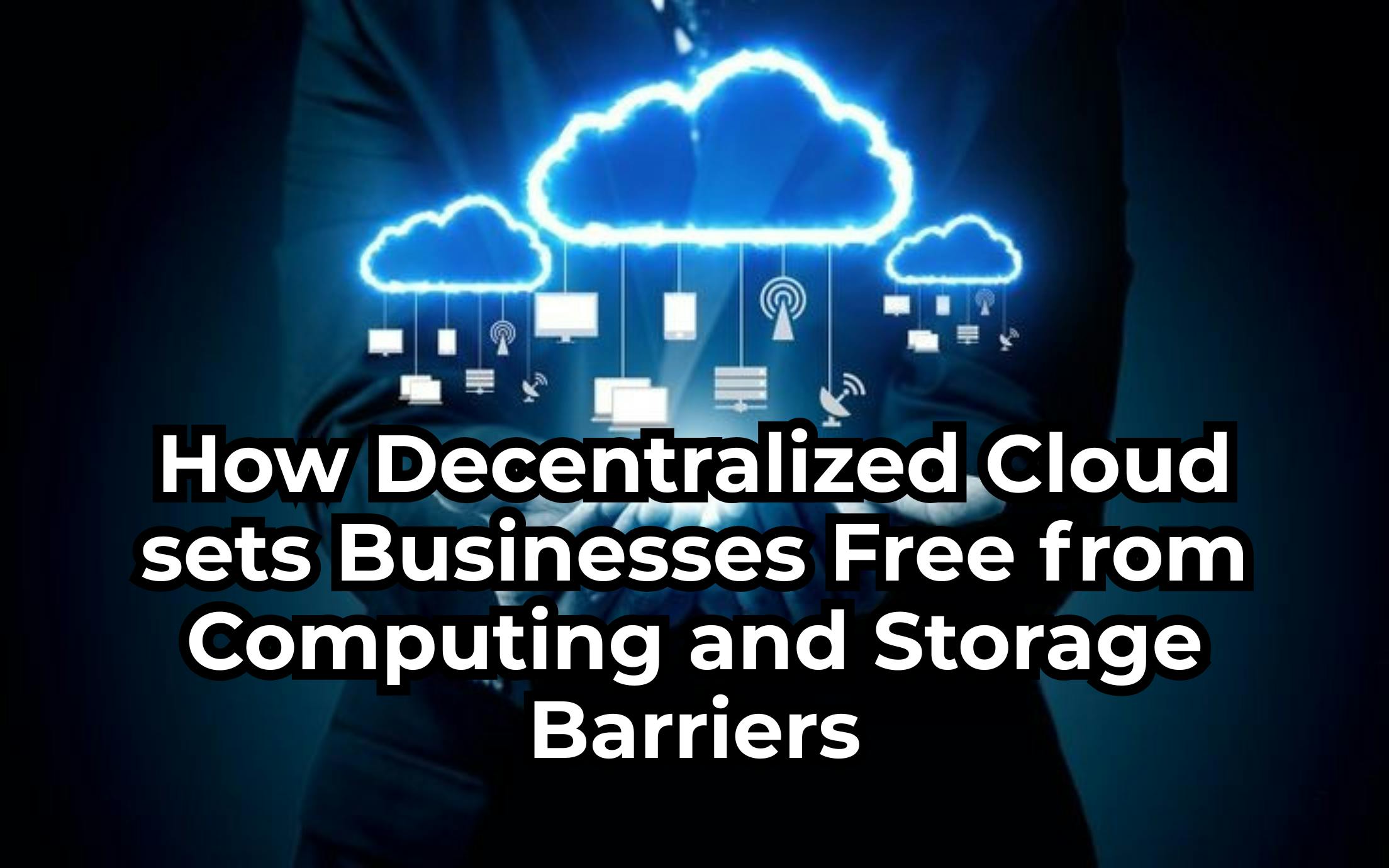Back in the days before the internet became part of our daily life, computing was a localized affair, with data stored on physical servers that required physical proximity for businesses to have access. The arrival of the internet introduced the concept of cloud computing, transforming how businesses store, manage, and process data by enabling access to computing resources over the internet. Traditional cloud services like Amazon Web Services (AWS), Microsoft Azure, and Google Cloud operate on a centralized model. These services rely on large data centers owned and managed by a single entity, with inherent barriers (challenges) like security vulnerabilities, censorship, and less control over data.
Traditional Cloud Barriers
Centralized cloud models, with their innovation, are vulnerable to single points of failure, where a data center outage can disrupt all users. They also raise significant concerns about data privacy and security, as users must trust the provider with sensitive information. Additionally, businesses often face vendor lock-in, making it costly and complex to switch providers due to compatibility issues and data migration challenges. With the emergence of blockchain technology, decentralized cloud emerges as a viable alternative for cloud computing and storage that sets businesses free from barriers.
Decentralized cloud computing differs by distributing computational resources, data storage, and services across multiple decentralized nodes, often powered by blockchain technology. This approach creates a more secure, transparent, and user-centric infrastructure that addresses the drawbacks of traditional cloud (centralized models).
Decentralized cloud leverages on peer-to-peer networks to enhance resilience, privacy, and cost effectiveness, to offer a promising edge for businesses seeking greater control over their data.
Why Decentralized Cloud: The Advantages
Research shows that decentralized cloud computing offers several advantages over traditional cloud services, making it a better option for businesses and individuals. And here is the detailed breakdown of these benefits.
Enhanced Security and Privacy: Decentralized clouds distribute data across multiple nodes, reducing the risk of data breaches. Each piece of data is encrypted and stored in different locations, making it harder for attackers to access the datasets. Moreover, users retain control over their data, as they can encrypt it before it leaves their device, ensuring privacy. For example, platforms like Aleph Cloud implement client-side encryption, mitigating risks associated with centralized storage vulnerabilities such as malware and man-in-the-middle attacks.
Resilience and Reliability: With no single point of failure, decentralized clouds are more resilient to outages and cyber attacks. If one node goes down, the network continues to function using other nodes, which ensures uninterrupted service. This resilience is particularly valuable for businesses reliant on continuous operations.
Cost-Effectiveness: Decentralized clouds are more affordable and efficient, especially for smaller businesses. By leveraging a peer-to-peer network, businesses can use underutilized computing resources from other participants, reducing the need for expensive infrastructure. For instance, smaller companies often find centralized cloud fees, like AWS’s $23 monthly charge for data center storage, as burdensome, whereas decentralized cloud providers like Aleph Cloud offer a more democratic pricing model.
Scalability and Flexibility: Decentralized clouds scale more easily by adding more nodes to the network, accommodating fluctuating demand without the constraints of centralized infrastructure. This flexibility is crucial for applications with variable workloads, such as AI and machine learning, in comparison with centralized models.
User Empowerment: With a decentralized cloud, individual users can monetize their computing resources by becoming node operators, creating a more inclusive ecosystem. This democratization allows individuals to earn rewards for contributing resources and promoting a community-driven approach.
These advantages position decentralized cloud computing as a compelling alternative, particularly for businesses seeking to mitigate the risks and barriers associated with centralized cloud. Several projects are already at the forefront of decentralized cloud, demonstrating its practical applications and benefits. Among them is Aleph Cloud, offering decentralized compute and storage solutions that address the limitations of centralized cloud barriers.
Understanding Aleph Cloud: The Web3 Supercloud
Aleph Cloud is a decentralized cloud platform that provides on-demand serverless computation, database, and storage infrastructure for decentralized applications (dApps) and protocols. Aleph Cloud leverages a two-layered architecture, comprising Core Channel Nodes (CCNs) and Compute Resource Nodes (CRNs). CCNs ensure security, process transactions, store data, and enable cross-chain communication, while CRNs provide computational power and data storage to ensure efficient task distribution. Unlike others that focus on static storage, Aleph Cloud handles data that needs real-time updates, making it ideal for dynamic applications. Aleph Cloud supercloud currently supports 24 chains for builders to seamlessly leverage Aleph Cloud innovation.
Aleph Cloud is like a decentralized AWS for Web3, which provides serverless computing, dynamic storage, and databases through a network of nodes rather than one company’s servers.
Aleph Cloud Key features: Real World Usage
Gaming and NFTs
Aleph Cloud powers dynamic NFT metadata for blockchain-based games, notably through a partnership with Ubisoft. Since 2021, Ubisoft has run a Core Channel Node on Aleph Cloud to manage NFT metadata for games like Champions Tactics and Captain Laserhawk. This ensures secure, tamper-proof data for in-game assets, letting players mint, trade, or sell items with unique traits. Aleph Cloud Verifiable Random Function (VRF) adds fairness by generating transparent randomness for gameplay, addressing centralized cloud risks of data manipulation or outages.
Decentralized Identity (DID)
Aleph Cloud works with Synaps and Anima protocol to offer secure, self-sovereign identity management. Users can control their personal data like KYC metadata, without relying on centralized databases, which reduces data breach risks. This is a major advancement for industries like finance and healthcare, where privacy is critical, and it frees businesses from the costs and vulnerabilities of centralized storage.
Decentralized Finance (DeFi)
Aleph Cloud supports DeFi apps by providing resilient storage and computing for order books, transaction data, and real-time processing computation. Aleph distributed indexing lets DeFi platforms on high-throughput chains like Solana query on-chain data efficiently, avoiding the single points of failure common in centralized clouds like AWS, for DeFi projects to stay true to decentralization while scaling operations.
AI and Machine Learning
Aleph Cloud’s scalable computing and dynamic storage are perfect for AI-driven projects with real-time updates. It supports startups and enterprises building AI agents or large-scale models, offering confidential virtual machines (VMs) with AMD SEV encryption for secure processing. For instance, Aleph Cloud integration with Libertai.io allows AI models to run on a decentralized network, ensuring privacy and resilience.
Web Hosting and Content Delivery
Aleph Cloud-powered TwentySix Cloud platform offers decentralized website hosting (static or dynamic) and content delivery networks (CDNs). By distributing content across nodes, it improves load times and reduces bottlenecks, unlike centralized CDNs that can falter under heavy traffic. Businesses can host apps or sites with less risk of downtime and lower costs.
Aleph Cloud also supports decentralized social media platforms, where user data stays private; supply chain tracking, with secure, real-time data from sensors; and healthcare platforms, where encrypted medical records are shared securely. These use cases show its versatility, helping businesses avoid centralized clouds barriers.
Aleph cloud provides confidential virtual machines (VMs) secured with AMD SEV encryption, for enhanced data privacy and security which is a critical concern for businesses dealing with sensitive information.
Businesses benefit from Aleph Cloud by reducing dependence on centralized providers, lowering costs, and gaining more control over their data.
Conclusion: Future of Decentralized Cloud
Decentralized cloud computing represents a significant shift from traditional cloud services, for enhanced security, privacy, resilience, and cost effectiveness. Projects like Aleph Cloud are at the forefront of this innovation, providing businesses with alternatives that address the limitations of centralized infrastructure barriers and single points of failure. For example, Ubisoft’s NFT platform avoids the risks of centralized storage, while DeFi apps scale without single points of failure. Aleph Cloud also allows Individuals to join as node operators, earning ALEPH tokens for sharing resources, for a community-driven ecosystem.
By embracing decentralized solutions, businesses can not only overcome the drawbacks of centralized clouds but also contribute to a more resilient and democratic digital ecosystem. As the landscape evolves, the potential of decentralized cloud computing is already setting businesses free from the constraints of traditional models.











